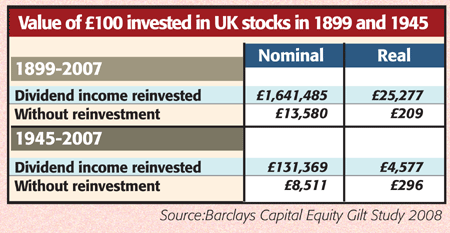Get the latest financial news, insights and expert analysis from our award-winning MoneyWeek team, to help you understand what really matters when it comes to your finances.
You are now subscribed
Your newsletter sign-up was successful
Want to add more newsletters?

Twice daily
MoneyWeek
Get the latest financial news, insights and expert analysis from our award-winning MoneyWeek team, to help you understand what really matters when it comes to your finances.

Four times a week
Look After My Bills
Sign up to our free money-saving newsletter, filled with the latest news and expert advice to help you find the best tips and deals for managing your bills. Start saving today!
The annual Equity Gilt Study from Barclays Capital has been "the bible of stockmarket optimists" ever since it was first published in the 1950s, says Damian Reece in The Daily Telegraph. It has always shown that over extended time periods, shares are the best investment. But this year's edition did little to cheer the bulls.
Between 1987 and 2007, UK equities returned an inflation-adjusted 6.7% a year, compared to gilts' 5.1%; over 50 years, shares have gained an annual 7.2% in real terms, compared to 2.4% for gilts.
The study underlines that reinvesting dividends is crucial. A hundred pounds invested at the end of 1945 would now be worth £296 in real terms without reinvesting income; but consistently doing so would lift the return over the period to £4,577. For gilts, the respective inflation-adjusted results, starting with £100, would be £2 and £158.
MoneyWeek
Subscribe to MoneyWeek today and get your first six magazine issues absolutely FREE

Sign up to Money Morning
Don't miss the latest investment and personal finances news, market analysis, plus money-saving tips with our free twice-daily newsletter
Don't miss the latest investment and personal finances news, market analysis, plus money-saving tips with our free twice-daily newsletter
But the past decade hasn't been kind to shares. They returned an annual 3.1% in real terms between 1997 and 2007, while gilts rose by 3% a year. This marks equities' worst ten-year return since their marginal annual fall in 1967-1977, the era of stagflation.

"Equities lost the title of best-performing asset of the past decade" as last year's weakness dragged the ten-year average lower, notes the report. The credit crunch reduced equity returns to 1% in 2007 compared with gilts' 1.2%. Cash did best last year with 1.8%, the first time in five years that it has outperformed all other assets.
In addition, an essay in the report says that the rapid industrialisation of the developing world, combined with the limited supply of resources, is pushing inflation higher; in the US and UK, a four-year rolling average of inflation has climbed by 1%, the first time since inflation was tamed in the early 1980s. The return of inflation will limit the scope for central banks to prop up economies with easy money in order to temper the effects of debt-fuelled speculative bubbles the pattern over the past two decades.
All this portends the end of the "Great Moderation", the era of smooth, non-inflationary growth. The steady pick-up in inflation pressures since 2005 has put paid to the housing and credit bubbles, while greater economic volatility and cyclicality, and higher interest rates and inflation, are also set to lower equity valuations. As Reece puts it, "the next decade offers even less investment cheer".
Get the latest financial news, insights and expert analysis from our award-winning MoneyWeek team, to help you understand what really matters when it comes to your finances.
MoneyWeek is written by a team of experienced and award-winning journalists, plus expert columnists. As well as daily digital news and features, MoneyWeek also publishes a weekly magazine, covering investing and personal finance. From share tips, pensions, gold to practical investment tips - we provide a round-up to help you make money and keep it.
-
 Should you buy an active ETF?
Should you buy an active ETF?ETFs are often mischaracterised as passive products, but they can be a convenient way to add active management to your portfolio
-
 Power up your pension before 5 April – easy ways to save before the tax year end
Power up your pension before 5 April – easy ways to save before the tax year endWith the end of the tax year looming, pension savers currently have a window to review and maximise what’s going into their retirement funds – we look at how

